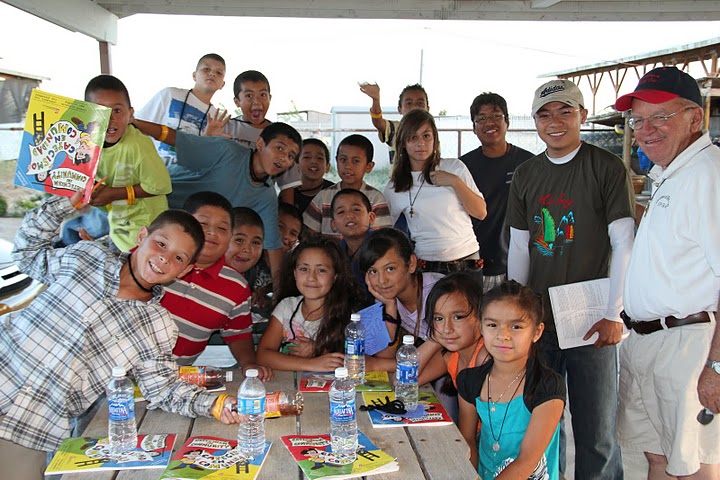Ministry Today#2 / Ministerio Hoy#2
Ministry of the Moment: Example of Jesus
When I was the Director for Campesino Ministry, I formed committee to coordinate our outreach to migrant farm workers. We called the committee, “Comité del ministerio extraordinario campesino.” It was obvious to us that working with migrants was anything but ordinary. Our ministry had to correspond to the lives of people who had little control of their time. My sabbatical working with people during the cherry harvest exposed me to the spontaneity of life that is typical of seasonal workers and people with lives made insecure by work and by conditions of legal status. I wrote in an earlier blog about an observation made by a bishop about our work with migrants. “You only have the time that God gives you.”
Jesus shows us how to respond to the person whom we may never see again. When the paralytic was lowered through the roof, Jesus saw that the person was not just paralyzed physically but also spiritually. He said, “Your sins are forgiven.” Then to prove that he had the power to forgive sin, he told him to pick up his mat and walk. The man is not mentioned again in the gospels. Jesus cared for the woman at the well, the woman caught in adultery, lepers, the blind and others who do not show up again in the gospels. Jesus addressed their needs in the moment. Too often people may come to our churches for help, and we need to address their need in the moment.
Yesterday’s story about Megan obviously needed a response in the moment. I am certain that other priests would baptize her because of the danger of death that was obviously present. Yet, when addressing migrants, we need to recognize that our response for migrants must be timely. It is easy to understand in the context of migrant farmworkers who follow harvest work from one state to another, but the same understanding of timely ministry is needed for anyone who is undocumented. This is especially true in communities with aggressive enforcement by ICE.
May God bless ministers with discernment of when it is necessary to modify sacramental preparation to the lived reality of the migrants seeking the grace of sacrament.
Ministerio del Momento: Ejemplo de Jesús
Cuando era el director del Ministerio Campesino, formé un comité para coordinar nuestro acercamiento a los trabajadores agrícolas migrantes. Llamamos al comité “Comité del ministerio extraordinario campesino”. Para nosotros era obvio que trabajar con migrantes que nueva misión no era ordinaria. Nuestro ministerio tenía que corresponder a la vida de personas que tenían poco control de su tiempo. Trabajando con la gente durante mi sabático me expuso a la espontaneidad de la vida que es típica de los trabajadores temporeros y de las personas cuya vida se vuelve insegura por el trabajo y las condiciones legales. Escribí en un blog anterior sobre una observación hecha por un obispo sobre nuestro trabajo con los migrantes. “Solo tienes el tiempo que Dios te da”.
Jesús nos muestra cómo responder a la persona a quien quizás nunca volvamos a ver. Cuando el paralítico fue bajado por el techo, Jesús vio que la persona no solo estaba paralizada física sino también espiritualmente. Él dijo: “Tus pecados te son perdonados”. Luego, para demostrar que tenía el poder de perdonar el pecado, le dijo que tomara su camilla y caminara. El hombre no se menciona más en los evangelios. Jesús cuidó de la mujer del pozo, la mujer sorprendida en adulterio, los leprosos, los ciegos y otros que no vuelven a aparecer en los evangelios. Jesús abordó sus necesidades en el momento. Con demasiada frecuencia, las personas pueden acudir a nuestras iglesias en busca de ayuda, y debemos abordar su necesidad en el momento.
La historia de ayer sobre Megan obviamente necesitaba una respuesta en el momento. Estoy seguro de que otros sacerdotes la bautizarían por el peligro de muerte que obviamente estaba presente. Sin embargo, cuando nos dirigimos a los migrantes, debemos reconocer que nuestra respuesta para los migrantes debe ser oportuna. Es fácil de entender en el contexto de los trabajadores agrícolas migrantes que siguen el trabajo de la cosecha de un estado a otro, pero la misma comprensión del ministerio oportuno es necesaria para cualquier persona indocumentada. Esto es especialmente cierto en comunidades con una aplicación agresiva por parte de ICE.
Que Dios bendiga a los ministros con discernimiento de cuándo es necesario modificar la preparación sacramental a la realidad vivida de los migrantes que buscan la gracia del sacramento.





